Naz Vahid’s Boss Told Her She Didn’t Have the Chops for Leadership. 15 Years Later, She Became His Boss.
March 01, 2019 | Filed in: Woman of the Week
When Naz Vahid was starting out at Citibank, her boss straight-up told her she didn’t have the chops for the banking job she wanted. Fifteen years later, she became his boss—and then his boss’s boss, and… you get the picture. Along the way, she also started the bank’s first mentoring program, and went on to lead its diversity committee. Here, she talks about transitioning jobs at 40, owning her seniority, and proving the naysayers wrong.
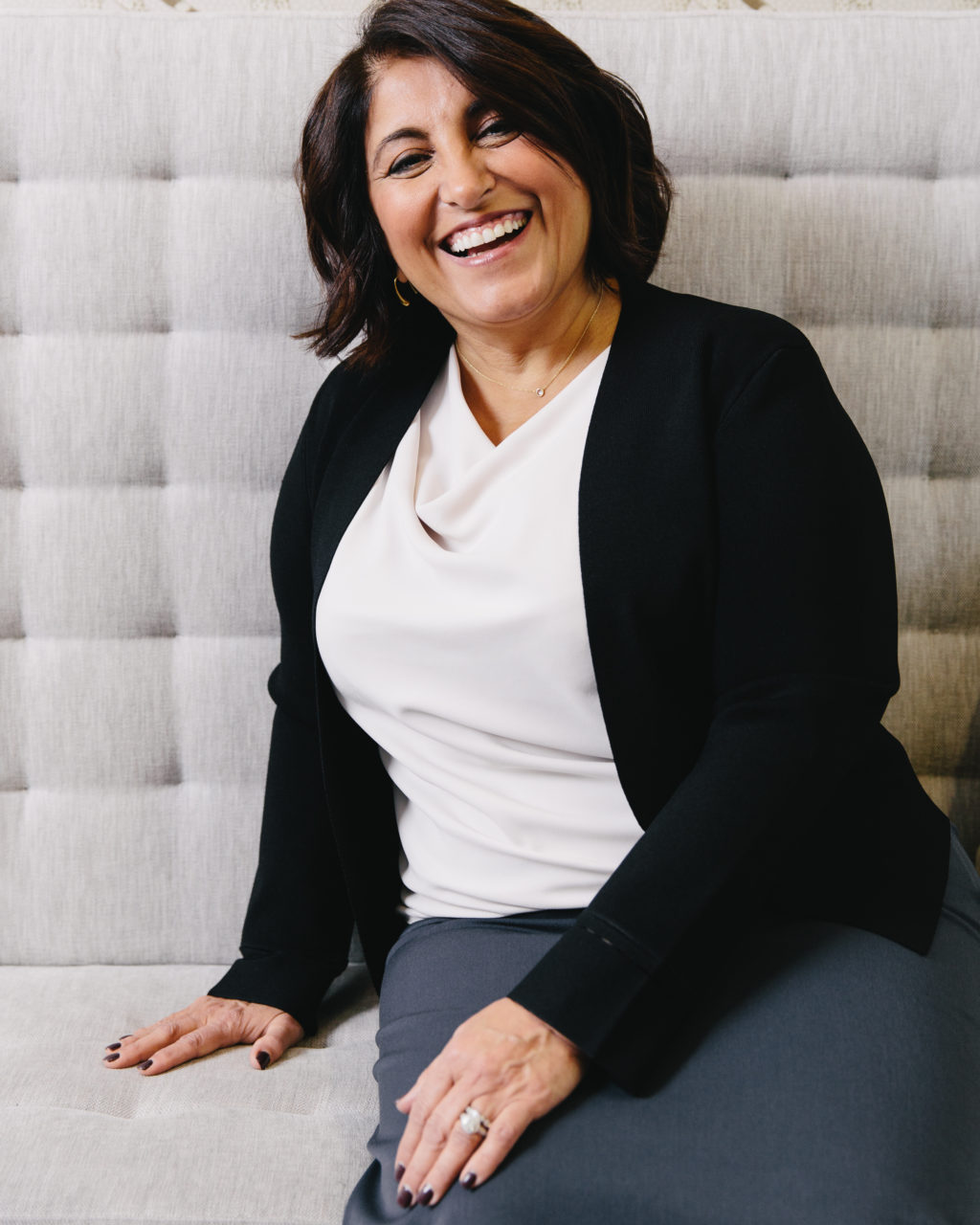
Naz wears the Rowling top, the Cobble Hill skirt, the Woolf jardigan, the Single Bezel necklace, and the Phoebe earrings.
I AM FROM IRAN, AND I CAME TO THE UNITED STATES when I was sixteen as a refugee during the 1979 Revolution. My brother and I went to live with my uncle in Long Island, and I finished high school there. I went to college in upstate New York, Hobart and William Smith Colleges, which was very lucky because my uncle wanted me to go to a secretarial school. I had an ESL teacher who said, “Absolutely not. You’re going to go to a great college and get a great education.” She took me on college visits and introduced me to the school where her daughter had gone, so that’s where I went.
THAT ESL TEACHER totally changed our lives. Our parents were in hiding in Iran when we first came here, and she became like a mother to us. She got my brother his first shaving kit and showed him how to use it. My uncle was wonderful to open his home to us, but he never had children, and all of a sudden to have two teenagers dropped on him was not easy. Now that I’ve raised teenagers, I know how difficult it must have been.
I GRADUATED FROM COLLEGE WITH A LOT OF STUDENT LOANS, so I wanted a job, but I also wanted to get my master’s degree, so I looked for a job that would allow me to go to school while I worked. Citibank used to have a program where it would pay for your graduate school as long as you kept your grades above a B. So, I worked full time and went to school at Columbia University part-time and that’s how my life at Citi started. That was thirty-three years ago so. I received my degree in International Affairs and International Finance, taking classes at night and on Saturdays.
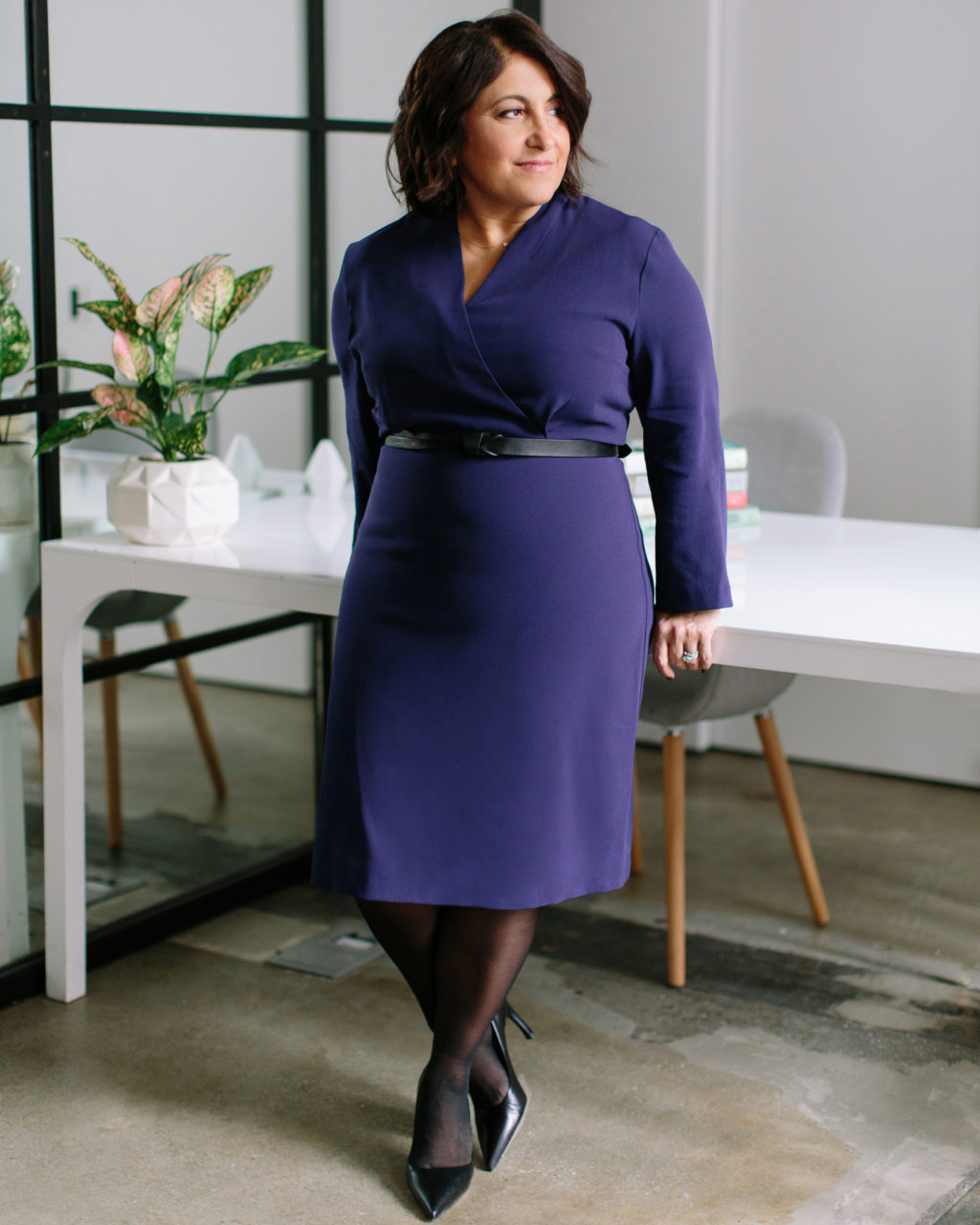
Naz wears the Niko dress, the Broadway belt, the Ginger pump, and the Single Bezel necklace.
I ALWAYS SAY THAT YOUR JOB HAS TWO PARTS: the part that you do because that’s your paycheck and the part that satisfies your soul. Let’s be honest, I’m not going to work every day and saving the world. I need an element to my job of giving something back.
PEOPLE OFTEN HAVE INFORMAL MENTORS, but I believe it’s important to have formal mentors too. When you become senior, you have a certain level of responsibility to give back to the community and mentor those who are less experienced than you. I helped start a mentoring committee at Citi Private Bank about six or seven years ago. Two years later, my boss asked me to hand the mentoring committee to somebody else and take over the diversity committee. Running the diversity committee at Citi Private Bank was probably my favorite thing I’ve ever done at work, outside of the revenue aspect of my job. It was so interesting to learn how many people consider themselves diverse. As part of the committee, we had a different person tell their diversity story every time we met. Anyone could tell them. Some of the nicest stories came from white men who had, for example, adopted diverse kids, and changed their understanding of the world because of it.
THE MAN WHO WOUND UP TAKING OVER the leadership of the private bank after a couple of years initially came and said, “I have nothing diverse about me. What could I talk about?” But when he told his diversity story, half of the women in the room were crying because of the way he talked about his wife. The importance of women in his life changed the way we saw him. That’s something I would not have known before this committee started. A person may not look diverse, but they may have a very interesting perspective on certain issues.
I EXPERIENCED CHALLENGES AS A WOMAN IN FINANCE, especially one with an accent. When I finished my degree, I decided to go into credit training at Citi. That’s how you become a banker. But you have to be sponsored for it. I went to talk to my boss and he said to me, “Naz, look, I know you’re smart. But, to be honest, as a woman with a name like Naz Vahid, you’re just not going to make it at the top.” When I say that now, people are shocked. But this was twenty-seven years ago, when people said a lot of stupid things. In retrospect, I think he was trying to help me. He wasn’t saying I shouldn’t have a job. He was saying, “Become an equity research person. You’re great with numbers, and you can be successful behind the scenes.” Still, no one had ever spoken like that to me, even my uncle who wanted me to go to secretarial school. I responded, “I think you are wrong. I think, one day, you are going to report to me.” And I walked out of the room. I don’t know where that came from, but I felt it very strongly.
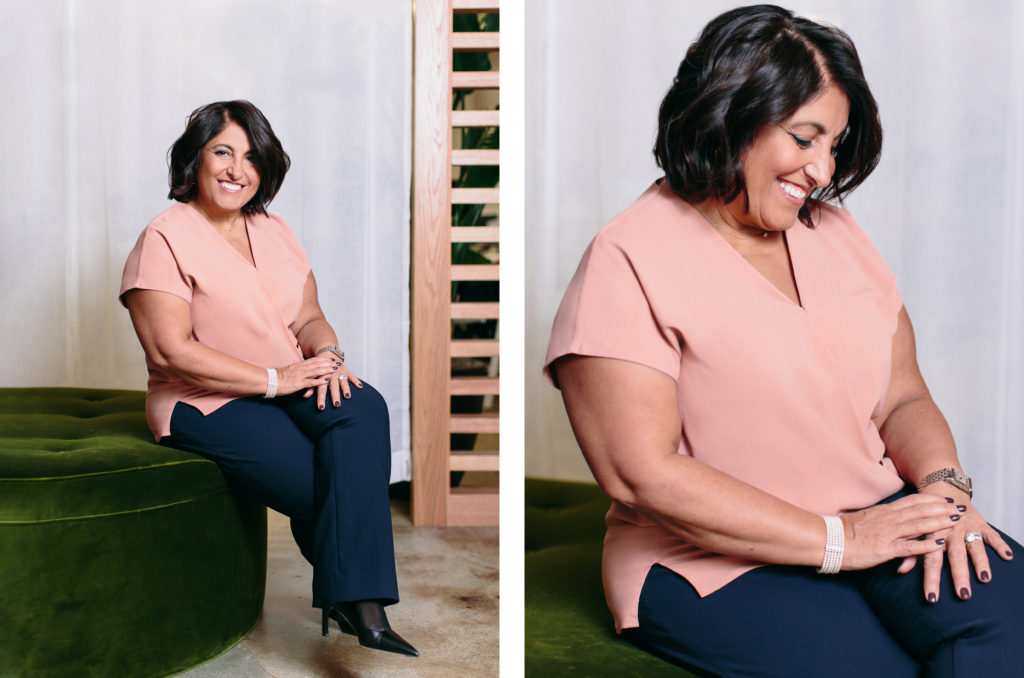
Naz wears the Antonia top, the Oshima pant, and the Ginger pump.
OF COURSE, I CAME HOME IN TEARS to my husband, and he said, “We are going to fight this. I know you can do it.” I managed to go around my boss to the person he reported to, and then I got accepted to the training program. Fifteen years later there was a redistribution within the company and that same former boss ended up reporting to me. I hadn’t intended it to happen that way, but it did. And when he retired a few years later, he told me, “What I said to you that day was one of the biggest mistakes of my career.” By that time, he had three daughters, and he said, “I always think to myself that I hope nobody ever says something like that to a daughter of mine.”
THERE ARE DIFFERENT WAYS OF LOOKING AT YOUR OWN SUCCESS. For example, I look at my daughter and wonder, “Is she getting enough of me?” I struggle with that today, even though she’s now twenty-two years old. I ask, “Was I supportive enough? Did I make it to enough sports games?” I don’t know if that question will ever leave my brain. I just have to live with it.
MY DAUGHTER IS 22 BUT WHEN SHE WAS YOUNGER, I was a banker, not a manager, and I had the ability to control my hours a little more. Sometimes I would go to work in the morning, leave at 3:00 p.m. to attend my daughter’s softball game, and then get back online to finish my work when my daughter went to bed at 9:30 p.m. Was I perfect? No. She would say to me, “Mom, you came to the game, but you were on your iPhone the whole time.” However, she would also say that her friends who had stay-at-home moms now want to be these crazy successful women because they felt like their mothers weren’t exciting—but I was. I did my best, and some days I got it right.
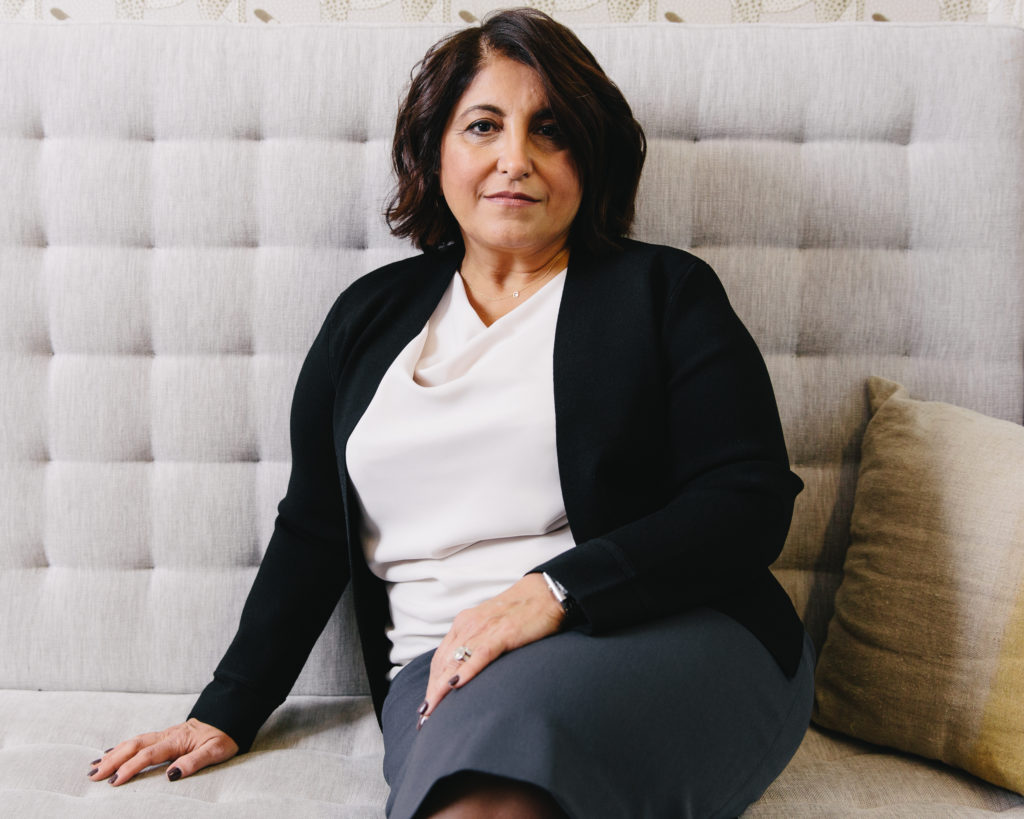
Naz wears the Rowling top, the Cobble Hill skirt, the Woolf jardigan, the Single Bezel necklace, and the Phoebe earrings.
I ALSO HAVE 23-YEAR-OLD SORT-OF DAUGHTER who came to live with us as a foreign exchange student when she was fifteen. She has become like a daughter over time, and part of the family. I put her through college and she calls me Mom. I am not her only mother—she still has her biological parents. She’s from Brazil, and she lives in Brooklyn now.
IN 2006, I LOOKED AT MYSELF AND SAID, “I’m forty, and I don’t want to be a banker for the rest of my life.” It was great, and I had a big book of business, but I was doing the same thing every day. So I went to my manager and said, “I want to look at other opportunities, both outside of the bank and inside of the bank.” And instead of reacting negatively, he said, “Have you ever thought about managing people? I know you like mentoring and teaching. What if you hired two bankers, split your book of business between them, and managed them? I think you’d like it.” What a smart move on his part, right? He was afraid I would go to another bank and take my relationships with me. But he was also right — I did like it. Then he asked me to manage another team, and then another, and then pretty soon I was managing a ton of people. It all started by accident because I was tired of being a banker. I think I was a good individual banker, but I’m a much better manager.
IT CAN BE REALLY HARD TO MAKE A JOB TRANSITION, not just because you’re learning a new one but also because you sometimes can’t let go of your old one. I was just talking to someone I manage a few days ago about this. He was struggling with something and I said to him, “Can we be honest for a moment? Are you still doing some of your old job?” And he said, “Well, sometimes it’s easier to just do it.” I said, “I get it. I’ve been there. But you’re never going to be really successful in your new job if you don’t let go of your old one. And you’re not being fair to the person who took your old job, because they aren’t getting to do it.” I’ve had at least nine different jobs over the 33 years I’ve been at Citi, and I’ve had to work very hard on this myself. That desire for control sometimes comes from our insecurities. Wanting to hold onto control comes from wanting to prove that you are the best at what you do, and that can come at the expense at getting better at something else.
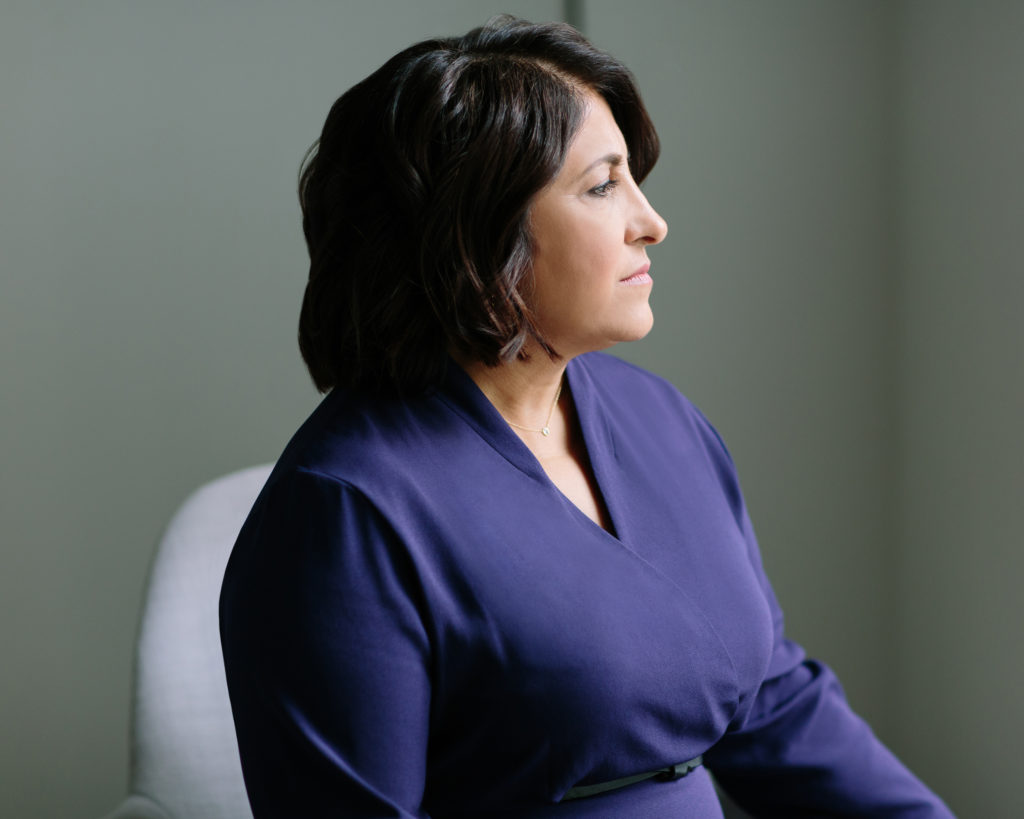
Naz wears the Niko dress, the Broadway belt, and the Single Bezel necklace.
WITHIN THE NEXT TEN YEARS, I would like to be slowing down, and eventually transition fully out of the workplace environment. But I don’t want to completely do nothing. So, now I am serving on two boards. It’s a lot of work when you have a full-time job, but I love it. I’m on the board of Bottomless Closet, which is a nonprofit that serves women who are out of a job and want to go back to work. It helps teach them how to interview, what to say, how to dress appropriately. I’m also on the board of the Tahirih Justice Center, which focuses on providing pro bono legal help to women who are suffering from violence, especially women immigrants—women who are too afraid to say anything when they are victims.
I’D SAY THAT MY DOGS ARE MY DOWNTIME. I’m a big animal person, and we have four dogs—two golden retrievers, a cocker spaniel, and a German shepherd. I spend a lot of time with them—walking them, petting them. I also read a lot, mostly thrillers. I like books that take my mind away.
MY ADMINISTRATIVE ASSISTANT IS ONE OF THE MOST IMPORTANT PEOPLE TO ME. She is my right hand. We’ve been together for eleven years. Without her, it would not only be almost impossible to do my job, but also it would be hard to balance my family responsibilities. I travel a lot. I also rely on my husband—he’s the one who keeps the home going so I don’t have to worry. A lot of women don’t have that, and I feel very lucky that I do.
Photographs by Christine Han. Styling by Sam Michel.





